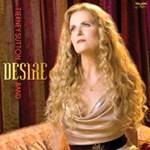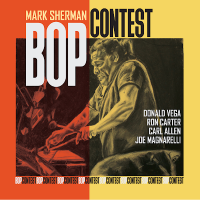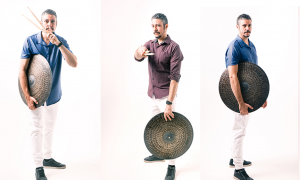Home » Jazz Articles » Interview » Alex Cline: Free-Spirited Drummer
Alex Cline: Free-Spirited Drummer
The strengths and the degree of potential of each musician is only going to enhance the overall music if one is able to harness and highlight and reproduce those strengths. I think that's a large part of what being a bandleader is about.
 West coast drummer/percussionist Alex Cline is a sensitive player with a strong feel for interesting harmonies, shifting voices and changing moods when he writes music. It's a sensitivity not usually associated with drummers. But what's inside Cline, and comes through in his music, is from an artist and a musician, not merely a drummer.
West coast drummer/percussionist Alex Cline is a sensitive player with a strong feel for interesting harmonies, shifting voices and changing moods when he writes music. It's a sensitivity not usually associated with drummers. But what's inside Cline, and comes through in his music, is from an artist and a musician, not merely a drummer.
He plays mainstream jazz gigs, but after his rock-influenced youth, he gravitated, almost by fate, to the free-form improvisers, getting his first break playing with Julius Hemphill. From that experience came a great many others. He's performed with an impressive list of musicians, including Wadada Leo Smith, Bill Frisell, Horace Tapscott, Henry Kaiser, John Carter. Cline, the twin brother of guitarist Nels Cline, headed in an improvisational direction from early on, recording a duo record with saxophonist Jamil Shabaka (Duo Infinity, Aten, 1977), and working on Vinnie Golia's Spirits and Fellowship (Nine Winds, 1977) with Carter and Roberto Miranda.
Cline, who grew up in the Los Angeles area and still resides there, was in his early 20s when a concert series materialized at a nearby venue, the Century City Playhouse, which was administered by an old high school friend. "It was a venue that attracted the more creative musicians playing jazz-type music here in L.A. back then," said Cline, adding with a chuckle, "Those people actually toured in their own country regularly at that time. This would have been in the day of things like Arista Freedom Records and Horizon and all these independent labels that were supporting that kind of music. So people coming through the west coast area had a place to stop in L.A. and play at the Century City Playhouse. Julius Hemphill was one of those people. He was coming through with Baikida Carroll and he wanted to play some music he had written for a trio (Hemphill on sax, Carroll on trumpet, with drums)." Cline was recommended and Hemphill was game.
"We played one gig here and he evidently liked what I did, so he invited me to play three nights with him up in Berkeley and invited me to play in Philadelphia, record an album and do a European tour. It was an amazing experience. I was 21 years old, from California—a wacky-looking guy with long blonde hair and a beard at the time. Nobody knew who I was. For him, it was a bit of a huge gamble." He also did a recording with Hemphill and Carroll at the end of 1977, "but it never came out," Cline recounts good-naturedly.
"The gig we did in Philadelphia had Abdul Wadud on cello, as well. (Julius) never told me what to play. I developed this distorted view of what playing this music could be like. The people I was playing with here, like Vinnie (Golia) and John Carter, were kind of the same way. Julius would get up and trust what I was doing and never told me, 'Do this. Do that. I want it like this.' He just let me play and he liked it, evidently. It was quite an experience for me."
It was experience that led him into a career of improvisational music that has many elements and influences. "I was incredibly fortunate in that the real elder statesmen of creative jazz music (in L.A.) were open and receptive to playing music with somebody like me, even going back to my early 20s," he said, respectfully. "If what I did seemed kind of potent, I was really still trying to figure out what it was all about. I got to play with people like John Carter and Ray Bradford and Horace Tapscott. This is not the most common experience elsewhere. These were people who were amazingly supportive and really open and accepting, and were also exemplary human beings. They were great role models for all of us. I feel incredibly blessed to have been here at a time when I was able to experience that with people like that."
Chapter Index
Cline plays straight jazz with others, but his own recordings don't cover that ground. His latest, Continuation, released this year on Cryptogramophone, is a strong representation of where Cline is artistically. It's pastoral, it's movie score-like, it's serene and it's thoughtful. Compositions shift to different colors and sounds. Joined by four other musicians—Peggy Lee on cello, Myra Melford on piano, Scott Walton on bass and Jeff Gauthier on violin—he puts forth a variety of textures, starting with the soft and moody opening to "Nourishing Our Roots," which picks up steam as violin, bass and cello dance over Cline's array of percussion. "Cleaning Our Streams" opens with a long statement from bassist Walton before Cline and others join in a softly swinging mode that then expands to a deeper driving groove over which Melford plays harmonium.
 To describe each composition isn't particularly relevant. It's for the ears and for the spirit. "Cleaning Our Streams" segues into an inspired, compelling, exultant collaboration. "Fade to Green" is more pastoral and abstract. But while loose, it hangs together. "Steadfast" is a strong vehicle that allows "blowing" time for the group. The solos are wrapped inside the form, but there's still room for free-wheeling. Overall, there are influences from classical music, world music and other traditions, and there is a free spirit in the solo space and the composition.
To describe each composition isn't particularly relevant. It's for the ears and for the spirit. "Cleaning Our Streams" segues into an inspired, compelling, exultant collaboration. "Fade to Green" is more pastoral and abstract. But while loose, it hangs together. "Steadfast" is a strong vehicle that allows "blowing" time for the group. The solos are wrapped inside the form, but there's still room for free-wheeling. Overall, there are influences from classical music, world music and other traditions, and there is a free spirit in the solo space and the composition.
"Each piece is different and takes its inspiration from different places, depending on the individual circumstance," says Cline of his compositional style and inspiration. "But overall, it would be safe to say that my ideas are heavily affected by my various musical influences, as well as by influences that are extra-musical—particularly in the case of a lot of the pieces on my last few CDs. If you, for example, have a piece dedicated to the memory of someone, there's something in that starting point that in some way dictates to me an idea that will take musical shape—even if it's a very vague and somewhat abstract idea.
"For the most part, my musical ideas come to me somewhat complete. In other words, the overall form and the overall idea comes to me first. Then I go about both filling in the blanks and putting all the details in, as well as editing my ideas as I go along, because frequently my ideas start a lot larger than they wind up.
"In terms of the music not being strict head arrangements and that sort of thing: I like that kind of music, but I think I'm usually trying to make some musical statement that is a little more broad than your basic head arrangement. Also, because I play a lot of (mainstream) music with other people, I don't feel a great need to do that myself so much, although some of what I do is almost like head arrangements. "Steadfast" on the new CD is as close as I get—that, and on Sparks Fly Upward (Cryptogramophone, 1999), the piece dedicated to Tony Williams, "Audacity." It functions fairly closely as more of a head arrangement kind of thing. But in both of those cases, when the theme comes back in the end, I've created a different musical setting for the theme at the end, so it isn't exactly the same."
The new record plays out naturally. There's no way to fully envision what is improvised and what is written. That pleases Cline, he notes with glee. "To me, when you can't really tell, when you get that blurring of composition and improvisation, then I feel like it's closer to being successful, according to my standard, my barometer."
Cline says he writes with his band members' skills and personalities in mind, yet he is aware that after a recording, there may be different musicians playing the music, because of schedules and people's availability. "I may wind up playing a piece that was originally written for someone who's no longer playing it. I will usually change the piece in some way that will work for those who are going to play it. So the music on Continuation was written specifically for these musicians to play.
"It helps to have some experience playing with the people and to have heard them enough to get a sense of what the possibilities are. The strengths and the degree of potential of each musician is only going to enhance the overall music if one is able to harness and highlight and reproduce those strengths. I think that's a large part of what being a bandleader is about. It's finding what's unique about each individual voice and being able to place that voice in the overall musical presentation in a way that will not only provide an opportunity for that musician to shine and have something interesting to explore as an artist, but also to create a much more successful and satisfying musical experience overall."

He admits that the music of Continuation wasn't put together with the thought that it would be later played live. The schedules of the band members are one reason. He's also aware that this type of music isn't the easiest to market and get venues and clubs to consider backing.
"It is difficult to find a venue for this kind of music. Not just because it isn't particularly categorizable, and certainly not particularly commercial, but because the dynamic range is really wide and the amount of space we can take up on stage—largely because of me—can be a challenge. Your average jazz club sometimes has too small of a space. But we're flexible," he notes. "It was harder in the days of the Alex Cline Ensemble when we had a lot more instruments, a lot of them were electric, and things took up a lot more space. That was a very difficult band to find a proper venue for. Especially when you have a vocalist. You need a good sound system and all that stuff."
He admits his larger group, the Alex Cline Ensemble, which existed for about 12 years, was difficult to book, and it was not easy to get the music presented properly. "I think part of the reason is that we didn't have a lot of opportunities to regularly play. So we couldn't get really comfortable and adjusted to the live context. That group, just in terms of getting the sound right, was really difficult. We'll see how it goes with this group. We haven't tried it yet."
class="f-right">
Knowing the music isn't particularly commercial, Cline has no inclination to change that just to try and be more popular. He sticks to his vision. Changing to more familiar forms "isn't a temptation for me. Part of the reason for that is, I work mostly as a sideman, therefore I play a lot of other people's music that covers a lot of the ground that my music doesn't cover. Yet my own music covers a lot of ground that other people's music doesn't cover. Nels and Alex Cline
Nels and Alex Cline
"When I put my musical ideas together, I do tend to limit myself and focus on certain things that I most want to hear and most want to experience. That tends to not include a lot of the areas that I already do and a lot of the areas that might be considered more commercial. My brother Nels plays a lot more music that reflects more of his rock influence, being an electric guitarist. While that's way back in my background, that's not something I'm tempted to do. In terms of what I'm trying to say musically, it's kind of irrelevant. But if it ever becomes relevant, I suppose I would do it. But it certainly wouldn't be because of a self-conscious (effort) to make the music more appealing, lucrative or to please somebody who might think it was cool or hip to do it.
"The same with doing a straight-ahead thing. I play a certain amount of straight-ahead jazz. I play a lot of people's music where, while it's not exactly straight-ahead, it employs a lot of the conventions of that music, like swing time, solos, trading fours. I really enjoy those things, but I don't feel a need to do that in my music, because my music seems to be more about something else."
Like his brother, the drummer was first influenced by rock music, which was the flavor of the day as he grew up. The '60s and early '70s were times when cutting-edge rock, jazz fusion and even folk-rock (Dylan plugging in), were prevalent. But his musical studies started on clarinet in elementary school, an instrument pushed on some kids so they could fit into the school orchestra. "I didn't like the clarinet at all, but I decided to play it anyway. My brother decided to play the trumpet. It was very soon thereafter we got the rock-and-roll bug. By the time we were 11, I had taken up the drum set and he had taken up the guitar."
class="f-right">
Says Cline, "I was the self-taught rock kid. My first real teacher was a school friend that I'd known since we were about 10, Pat Pile, who was already quite the young drum prodigy and had a drum set, which was huge back then. I would go to his house and we would take turns playing the drum set. I would watch what he did and try to imitate what he was doing. We would take turns playing with Rolling Stones records and such. That was my first fundamental drum set training, which was quite good."
He and his brother heard the Jimi Hendrix Experience when they were 11, and both were amazed, having their eyes and ears opened by the daring guitarist. For Alex, the group's drummer, Mitch Mitchell, whose playing had some jazz influence, was a wonder. Mitchell became an early idol. That experience helped lead him down a path that found him discovering drummers like Tony Williams, Elvin Jones, Jack DeJohnette, Roy Haynes, Tony Oxley, Pierre Favre and onward.
He says the music of Frank Zappa and Captain Beefheart in those years also gave him "a taste for squealy saxophones and odd meters and strange instrumental combinations and instrumental music altogether."
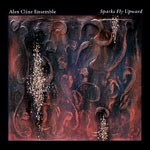 Cline took some drum lessons, but they weren't very productive. At age 16, he started digging jazz more. The high school stage band, which is to say jazz band, was in need of a drummer. A friend recommended Alex for the drum chair. "This friend, inaccurately," he says with a laugh, "thought I had the talent to go in there and play that music. I naively said, 'OK.' But I couldn't read and I couldn't play swing—slight liabilities."
Cline took some drum lessons, but they weren't very productive. At age 16, he started digging jazz more. The high school stage band, which is to say jazz band, was in need of a drummer. A friend recommended Alex for the drum chair. "This friend, inaccurately," he says with a laugh, "thought I had the talent to go in there and play that music. I naively said, 'OK.' But I couldn't read and I couldn't play swing—slight liabilities."
"It was at that point, after experiencing total humiliation first thing every morning at the high school in tenth grade, that I got more training. I had about two years of drum lessons with a couple of teachers here in town. Unfortunately, that's the sum total of my musical training. Even they were not teachers who had any interest or involvement in the kind of music that I was really looking to do. At that point I was interested in playing like Tony Williams and Jack DeJohnette and Elvin Jones and Roy Haynes, people like that. Where would you learn to do that? Nobody told you how to do that. I had to wind up figuring that out all by myself."
Another huge influence came when someone loaned the brothers Cline a copy of the compilation The Best of John Coltrane: His Greatest Years (Impulse!, 1971).
"A friend of ours suggested we ought to listen to it, thinking of me in particular. He said, 'I think you'd like it because parts of it are really noisy.' (Chuckles) We put it on and my brother and I were completely and totally changed after hearing just the opening of 'Africa,' never having realized that jazz can even sound like that until we heard that. It completely changed us.
"The other thing was the first time I heard a track of Tony Williams with Tony Williams Lifetime, with John McLaughlin and Larry Young. I realized, because of my taste in music—early Frank Zappa and King Crimson and stuff like that—what was happening musically, even though I couldn't totally understand it. It wasn't completely unfamiliar to me. But it was on a level that was completely beyond anything I'd ever imagined—certainly the drumming was. When I heard that, I knew that was it. I was never the same after that. There was no turning back at that point. So everyone who'd been associated with John Coltrane's music—and Miles Davis, everyone who'd been associated with his whole musical trajectory—became that which obsessed teenage Alex," he recalls. "That was it. I didn't go back after that."
class="f-right">
It was in high school that Cline also began exploring various percussion instruments. In his music, and his composition, he's as much a percussionist as straight drummer. He puts various instruments to work in wonderful ways, adding color and texture—sometimes stark noises that start to take the music in another direction.
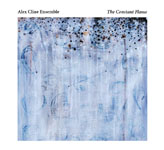
"It was a combination of a lot of those kinds of sounds being introduced into music at that time, in a fairly pronounced way," he says. "Miles was using Aierto Moiera and the Weather Report stuff with Dom Um Romao; and Pharoah Sanders and that whole post-Coltrane thing where there was a lot of exotic percussion being employed. The AACM, with all the unusual percussion instruments and people like the Art Ensemble Of Chicago using a lot of gongs and all kinds of sounds. Then there were people I was listening to coming from the European scene who were playing jazz and free improvised music, some of whom had a profound influence on me. Most notably, a British percussionist named Frank Perry, Pierre Farve from Switzerland, Tony Oxley from England. People in the so-called avant-garde. All those guys. That really attracted me.
"My brother and I had both been obsessed with unusual sounds—different ways to make them and get sounds to happen. That's always been a fascination for both of us. The other thing was the funny noise aspect of that. For me, there became cultivated a deep appreciation and love for beautiful long, sustaining resonant sounds. The instruments that can produce those sounds have often wound up being some of my best teachers. Those sounds can demand that they be respected and employed in certain ways. Those are sounds and that is an approach that continues to inform a lot of my own musical ideas and find their way into the music that I make.
"This is one of the reasons that, early on, I got into giving solo percussion concerts, though I don't do much of that now. I really wanted a lot of those sounds to be able to be heard, unimpeded. Now I try to create contexts for them. At the same time, I still like playing the drums, whether it's jazz or whatever it is. (Playing percussion) is another side of what I do that's very strong. I try to combine it all somehow and hope it all makes sense in the end."
Cline attended Pierce College in Los Angeles and was an art student. He was still uncertain about his future, but his eventual goal was to become an art teacher. "That was a plan put into place before the music thing became so overwhelming. I could see the musical impulse was taking over. My inspiration was taking the form of music rather than the visual art medium. I took a break from going to college to figure out what direction I was going to decide to go. During that break was when I recorded my first three albums and did a European tour with Julius Hemphill. There ended my academic art career."
Cline's reputation got around and work grew. In 1979, Alex and his brother, along with pianist Eric von Essen and Gauthier formed Quartet Music, a group that had four recordings over its life and was awarded grants from the National Endowment for the Arts and the California Arts Council. Some of Alex's compositions came to the fore in that group and he has also served as composer and/or performer for numerous modern dancers and dance companies in Los Angeles, including Margaret Schuette, Linda Fowler, the Momentum Company, Dance/LA, the UCLA Dance Company, Belinda Cheng's Auricle Ensemble, Oguri and Roxanne Steinberg (Body Weather Laboratory), and Open Gate Theatre. Visual artists with whom Alex has collaborated for live performances include Carole Kim, Yoshio Ikezaki, Kio Griffith, 2-Tu, and Norton Wisdom.

He recorded his first album, the solo percussion double-LP Not Alone (9 Winds), in 1982. His first album as a bandleader-composer, The Lamp and The Star (ECM) was done in 1987. The Alex Cline Ensemble produced three more albums. Cline's compositions are also heard on recordings or in performances by Dennis Gonzalez, Shooting Stars and Traffic Lights, Barre Phillips and the Jeff Gauthier Goatette.
"The Alex Cline Ensemble didn't get to play that much. Quartet Music was extremely active for about 11 years. We played a lot of gigs. We had a huge repertoire of music, most of which, sadly, is not documented, " Cline says. "Eric von Essen wrote most of our music, but we all contributed compositions to that group. That group demanded that I put together a setup of instruments that was completely different than the one I used for anything else. It became a very strong collective unit. But during that time, I was still playing all kinds of music with other people that largely defined how I spent most of my time.
"At the same time, it might be said that the level of enjoyment and commitment that I experienced with groups like Quartet Music and other groups I was playing with in town—that was one of the reasons I never moved (from L.A.). That, and extra-musical reasons like the fact our family was here and things like that. I didn't ever feel a deep need to relocate because I was really enjoying and committed to what I was doing here.
"Now I don't travel much at all. I play here. I do a lot of different things on the west coast. But it's pretty rare that I get out of here."
class="f-right">
Composing remains one of the things that occupies Cline, especially when it comes time for a recording.
"Every piece is a bit different. I will say that it tends to be hard for me to make time to compose. One of the reasons this record (Continuationgot finished was because...two big reasons. One is when I got the idea to do it and (label owner and executive producer) Jeff Gauthier gave it the green light and started pestering me to make it happen, I wound up ultimately having a deadline. And deadlines are good for productivity sometimes," says Cline. "The other main reason is that after completing the other two Cryptogramophone CDs I did as a leader (Sparks Fly Upward, 1999; and The Constant Flame, 2001), the Alex Cline Ensemble ones, a lot of things in my life changed. I wound up having not even less time to compose, but no time to compose. I also didn't have the concentration anymore to compose, largely due to my becoming a parent and having to deal with all that. I couldn't sit down and concentrate in a way that was productive up until about the fall of 2007. It was kind of like the fog lifted and I was able to concentrate like that again.
"Between that and the deadline to do this project after, happily, the participants that I wanted involved all agreed to do it. It came really quickly. In the case of this particular music, in comparison to some of the music I had done on other projects, the music went quite fast. Part is because I tend to have the overall idea already in place, so I'm not groping along from bar to bar. Also, because I felt that this time I tried to write a little bit less and allow the musicians' improvisational skills to be more present in the music and have more opportunity. Also, for some reason I wasn't as attached to the details of this music. So when I came up with something that was pretty much what I wanted to say, I just stopped, rather than go back and re-work it again and again, as I might have in the past. I just let things be and didn't overwork things as much. It went quickly this time, relatively speaking."
While times are tough for many musicians, Cline stays busy. In fact, "I can be a little too busy for my own taste," he says. "I do work part time (at the Center for Oral History Research at UCLA) in order to guarantee steady money. I made this decision over 20 years ago because I don't want to feel the stress of having to hustle gigs. I don't want to put that expectation on everything I do, that it pay me a certain amount of money to be worth doing. If nothing else, that's an unrealistic expectation if one is going to continue to play this kind of music."
 Between being a father, keeping things straight at home and pursuing other interests, including curating a concert series in Los Angeles, "I'm way too busy for my own liking at this point. I'd love it if I could simplify my life a lot more. It doesn't seem possible though," he says with a soft laugh.
Between being a father, keeping things straight at home and pursuing other interests, including curating a concert series in Los Angeles, "I'm way too busy for my own liking at this point. I'd love it if I could simplify my life a lot more. It doesn't seem possible though," he says with a soft laugh.
He also worked with his brother on a project that he estimates will be released in the fall. "It's music that Nels did, commissioned by producer and writer David Breskin, based on artwork by L.A. artist Ed Roche. It's a very ambitious 2-CD and coffee table art book project a German publisher is doing. That's about as big a product as I can imagine being part of."
"There are always things I'd like to someday do, " he says of his own career." Right now, I'd like to be able to play more with this same group (from Continuation), because it was such an extreme pleasure and honor to play this music with those people. I do have it on my wish list to someday do a recording of improvisations as a duo with Myra Melford. We did that with dancers and it was deeply satisfying to me artistically, and it was also fun. I would like to do a solo percussion recording again at some point. I'm not crazy enough to think that there's more than 20 people interested in that. That's not something I'm thinking is on anybody's priority list.
"Otherwise, my goals are pretty modest. I don't have any big pet projects I'm angling toward getting done at this point. It's one step at a time for me. I'm really happy I was able to do this particular CD project. It started out as what I thought was a pipe dream and ended up actually happening. I couldn't be happier, really."
Selected Discography:
Alex Cline, Continuation (Cryptogramophone, 2009)
Jeff Gauthier Goatette, House of Return (Cryptogramophone, 2008)
Jeff Gauthier Goatette, One and the Same (Cryptogramophone, 2006)
Alex Cline/Kaoru/Miya Masaoka/G.E. Stinson, Cloud Plate (Cryptogramophone, 2005)
Alex Cline Ensemble, The Constant Flame (Cryptogramophone, 2001)
Nels Cline, Destroy All Nels Cline! (Atavistic, 2001)
Various Artists, The Music of Eric Von Essen, Vol I (Cryptogramophone, 2000)
Alex Cline Ensemble, Sparks Fly Upward (Cryptogramophone, 1999)
Alex Cline Ensemble, Montsalvat (Nine Winds, 1996)
Alex Cline Ensemble, The Lamp and the Star (ECM, 1987)
Alex Cline, Not Alone (Nine Winds, 1982)
Alex Cline, Nels Cline, Eric von Essen, Jeff Gauthier, Quartet Music (Nine Winds, 1980)
Vinnie Golia, Spirits and Fellowship (Nine Winds, 1977)
Jamil Shabaka & Alex Cline, Duo Infinity (Aten, 1977)
Photo Credits
Courtesy of Cryptogramophone
Featured Story: Anne Fishbein
Tags
PREVIOUS / NEXT
Support All About Jazz
 All About Jazz has been a pillar of jazz since 1995, championing it as an art form and, more importantly, supporting the musicians who make it. Our enduring commitment has made "AAJ" one of the most culturally important websites of its kind, read by hundreds of thousands of fans, musicians and industry figures every month.
All About Jazz has been a pillar of jazz since 1995, championing it as an art form and, more importantly, supporting the musicians who make it. Our enduring commitment has made "AAJ" one of the most culturally important websites of its kind, read by hundreds of thousands of fans, musicians and industry figures every month.



